
Support the 2019 Share Literacy Holiday Program.
Choose a thank-you gift of books by Robert Ornstein.
Robert Ornstein dedicated his life’s work to advancing the science of human consciousness and bringing the insights to the general public. His early work focused on how we experience time and the sometimes illusory nature of our perceptions of the “real world.” His pioneering research on the bilateral specialization of the brain gave us the terms “right brain” and “left brain.” The groundbreaking books The Psychology of Consciousness and The Evolution of Consciousness introduced two modes of consciousness and provided a critical understanding of how the brain evolved. He ultimately came to depict the mind not as a unified whole, but as a composition of multiple processing systems adopted for life in the Pleistocene era, and he continually stressed the need for mankind to understand and move beyond these systems to respond to the challenges of the modern world.
His books provide an ongoing legacy inviting readers to rethink our origins, human nature, and the necessity of extending human capacities toward “conscious evolution.” ISHK’s private collection is an exclusive source of original, unused copies, including rare editions in other languages. We’re happy to release them in appreciation for your ongoing support.
Click a donation level to see gift details:
$350: Set of 12 books (English)
$250: Set of 7 books (Japanese or German)
$200: Set of 5 books (English, German, or Dutch); or set of 4 books (Japanese or Swedish)
$175: Set of 3 books (English, German, Japanese, Swedish, Dutch, Spanish, or Portuguese)
$125: Set of 2 books (English, French, Japanese, Swedish, Portuguese, or Italian)
$100: Single book (books available in English and 12 other languages)
Note: Each gift set includes a combination of paperback and hardback copies of various editions. All are in limited supply and will be given to donors on a first come, first serve basis. If your gift selection is no longer available when we receive your donation, we will substitute a selection of books in the same language to the extent possible (plus English editions if necessary), as close as possible to your first choice. Gifts books will be packaged and shipped during the week of November 11, 2019.
With your donation of $500
Complete set of all 22 Books by Robert Ornstein in English:
The only 4 complete sets available anywhere!
On the Experience of Time (1969)
How do we experience time? What do we use to experience it? As a young graduate student Robert Ornstein showed, in a series of remarkable experiments, that it is difficult to maintain an “inner clock” explanation of the experience of time. He postulated a cognitive, information-processing approach that alone makes sense out of the very different data of the experience of time and, in particular, of the experience of duration – the lengthening of duration under LSD, for example, or the effects of an experience felt to be a success rather than a failure, time in sensory deprivation, the time-order effect, or the influence of a sedative or stimulant drug.
On the Psychology of Meditation (original essay with Claudio Naranjo)
The authors drew on the history of Eastern religions and philosophies as well as on Western experimental laboratories. From Zen, Yoga, the Sufis, and shamanism came the roots of the book’s synthesis of the multiple manifestations of meditative techniques. From contemporary experimental work with computers and electroencephalograms came a new insight into the nature of consciousness. With Naranjo’s demonstration of the unity of meditation beyond its forms, and Ornstein’s “translation” of the metaphors of esoteric traditions into those of modern psychology, this book as a whole proved a keystone work in the study of the experiential, psychological, and physiological aspects of meditation, a practice which continues to proliferate in the world today. (See also Meditation and Modern Psychology, the 2008 update of this classic work).
The Psychology of Consciousness
In his revolutionary study, originally published in 1972 and in two subsequent revisions, Robert Ornstein examined the science to answer the question “What is consciousness?” and provide us with the concepts of “left” and “right” brain. In his 1986 “Completely Revised and Updated” edition, through a consideration of intuition and reason, he went beyond the theory that creative impulses originate in the right side of the brain and rational impulses originate in the left side to show how a synthesis of these two functions can bring about “a more complete science of human consciousness with an extended conception of our own capabilities.” He revisited the science some 25 years later in The Right Mind, to further evolve our understanding of the hemispheres.
The Nature of Human Consciousness (1973)
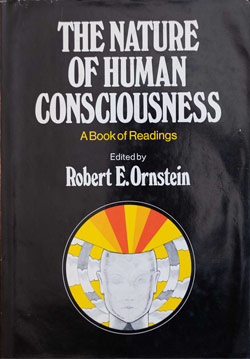
Drawn from the fields of anthropology, psychology, philosophy, mystical religion, and physiology, this early work provide a tableau of insights into human consciousness. The ideas of William James shed light on those of Idries Shah, who writes of the Sufis. Carl Jung’s discussion of “Synchronicity” provides background for Charles Tart’s “Preliminary Notes on the Nature of Psi Processes.” As a young and imaginative psychologist and researcher, Ornstein collected and conceptually integrated 41 articles into a book that continues to serve as stimulating reading on cognition and consciousness.
Common Knowledge (1975)
This book came about when in the 1960s, the San Francisco Chronicle began to run stories on “weird , improbable happenings” that do go on in life but are not often reported. Like the time a can of foot powder was elected mayor. “These little stories have a cumulative effect…They shake us out of our fixed, arrogan assumptions about what can happen in life. We begin to realize that these stories are closer to the truth of living than the stylized reportage which we normally think of as the “news.” Long out of print, the four, albeit damaged, copies in ISHK’s collection may truly be the last available anywhere.
The Mind Field (1976)
The excesses of the self-improvement packagers have obscured what may be of real value. Meditation may be a valid method for eliminating stress, but are maharishis and franchised growth centers the requisites for achieving peace of mind? How is it that promoters have supplanted real teachers in the realm of consciousness? Ornstein extends his argument to the sacrosanct psychiatric profession, as well as to meditation, para-psychologies, shamanism, and the numerous trademarked “awareness systems.”
Symposium on Consciousness (1977)

This collection of papers was presented at the annual meeting of the American Association for the Advancement of Science in 1974 at a symposium conceived and arranged by Robert Ornstein and Philip R. Lee, Assistant Secretary for Health and Human Services in the Johnson administration, in conjunction with the Institute for the Study of Human Knowledge. Though much has been learned in the nearly half century since the event, the book stands as a foundational work in brain/consciousness research.
The Amazing Brain – with Richard F. Thompson (1984)
With its stunning illustrations, this book continues to provide an accessible primer on the object responsible for everything from our most primitive behaviors to the creation of civilization – its construction, electrical and chemical processes, and “ramshackle” evolution over millions of years.
Psychology: The Study of Human Experience (textbook) (1985)
In his preface to this work, Ornstein writes that the idea for this work came to him as a student in his first introductory psychology class. Some 25 years later he delivered “the story of our lives. It begins where human life emerges and continues in each of us, until we die. In it there are glimpses of the human condition and of human possibilities…I hope to show clearly how extraordinary the ordinary experience of life really is.”
Multimind (1986)
Multimind presents a startling new concept of how the human mind works – not as a super computer but a far more complicated system made up of a number of “computers,” each with a special function and each brought in sequentially and perhaps even simultaneously to process the immense amount of information we need to survive and deal with the outside world.
The Healing Brain – with David Sobel (1987)
In this intriguing, fact-filled exploration of the myriad healing powers of the brain, Ornstein and Sobel show us how the brain constantly interacts with the body, changing its responses to experience. Combining neurological research with holistic health concerns, The Healing Brain was an outgrowth of ISHK’s landmark seminar series that helped to launch the now ubiquitous understanding of the role of mind in health.
Healthy Pleasures – with David Sobel (1989)
This book delivers the scientific evidence that pleasures – from saunas to siestas, chocolate to charity – and positive attitudes such as happiness to optimism are not only enjoyable but contribute to your life-long health.
New World New Mind – with Paul Eherlich (1989)
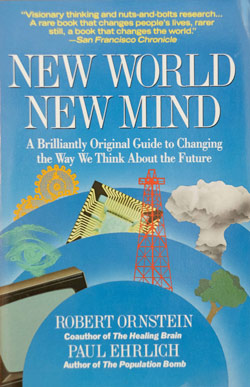
Culturally and biologically, humankind has evolved further and faster than any other species on earth. In the process, we have also changed the planet more in the past ten thousand years than all its inhabitants did in the first four million. Almost three decades ago, New World New Mind provided a lucid investigation into what we have done to our planet . . . and a warning about the consequences of progress “as usual.” Unless we consciously evolve to fit our advanced society, we will destroy all that we have created. We need to develop a new mind – a set of thought processes, reactions, perceptions, and impulses – for our new world.
The Healing Brain: A Scientific Reader – with Charles Swenciones (1990)

This volume, composed of contributions by noted researchers in psychiatry, psychology, and neuroscience, explains the fascinating investigations of brain-mind-body relationships that changed the way we think about health and illness.
The Evolution of Consciousness (1991)
The Roots of the Self (1993)
The Axemaker’s Gift – with James Burke (1995)

At the close of this century of creativity and discovery, humanists and scientists alike wonder: How could human beings in all their brilliance –those “axemakers” with the genius to invent, lead, inspire, heal, design – have brought the world to the brink of destruction? The answers can be found in this imaginative and brilliantly informed double-edged history of human culture.
The Healthy Mind, Healthy Body Handbook – with David Sobel (1996)

“The Healthy Mind, Healthy Body Handbook offers easy-to-understand, practical advice on improving physical health and leading a happier, more productive life. From how to manage stress, moods and illness to communicating effectively, this book offers guidance that can make a positive impact in your life now and in the future.” – C. Everett Koop, MD, former US Surgeon General.
The Right Mind (1997)
In this follow-up 25 years later to his classic Psychology of Consciousness, which first introduced us to the concept of specialized functions of the brain hemispheres, Ornstein draws on later research to dispel the popular myths and refine our understanding. While facts (what we might think of as text) are stored and processed in the left hemisphere, the right mind sets the context and makes sense of it all. It is this contextual function he argues, that may hold key to our ability to “choose, by a complex process involving all the brain’s power, what we might call ‘the right mind’ for different situations.”
Mind Real (2008)
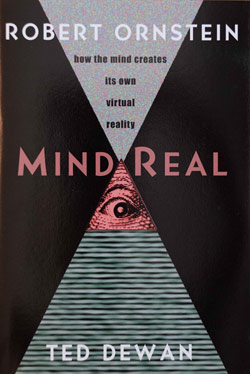
This book details one of the most startling findings of modern science: We don’t experience the world as it is, but as virtual reality. This crucial insight provides a meeting point for students of the mind, brain, philosophy and religion, as all these disciplines begin at the same place. Mind Real is, in part, a summa of Dr. Ornstein’s research and writing of the previous 35 years.
Meditation and Modern Psychology (2008)
This update to the 1971 essay On the Psychology of Meditation by Claudio Naranjo and Robert Ornstein examines meditation from the perspectives of religions and philosophies such as Zen, Yoga, the Sufis and Christian mystics, and from the modern psychologist’s point of view – what is happening neurophysiologically and what is the resulting experience? This modern scientific view is sympathetic to the practice of meditation as a tool which, under the right direction, can leads to a different mode of perception.
Humanity on a Tightrope with Paul Ehrlich (2010)
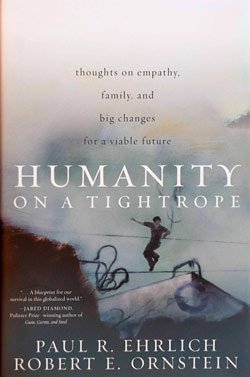
The two seasoned authors tackle the question of family and what it means to us now and how it might change to help us address the problems that affect us all.
With your donation of $350
Set of 12 Books in English:
10 sets available
On the Experience of Time (1969)
How do we experience time? What do we use to experience it? As a young graduate student Robert Ornstein showed, in a series of remarkable experiments, that it is difficult to maintain an “inner clock” explanation of the experience of time. He postulated a cognitive, information-processing approach that alone makes sense out of the very different data of the experience of time and, in particular, of the experience of duration – the lengthening of duration under LSD, for example, or the effects of an experience felt to be a success rather than a failure, time in sensory deprivation, the time-order effect, or the influence of a sedative or stimulant drug.
On the Psychology of Meditation (original essay with Claudio Naranjo)
The authors drew on the history of Eastern religions and philosophies as well as on Western experimental laboratories. From Zen, Yoga, the Sufis, and shamanism came the roots of the book’s synthesis of the multiple manifestations of meditative techniques. From contemporary experimental work with computers and electroencephalograms came a new insight into the nature of consciousness. With Naranjo’s demonstration of the unity of meditation beyond its forms, and Ornstein’s “translation” of the metaphors of esoteric traditions into those of modern psychology, this book as a whole proved a keystone work in the study of the experiential, psychological, and physiological aspects of meditation, a practice which continues to proliferate in the world today. (See also Meditation and Modern Psychology, the 2008 update of this classic work).
The Psychology of Consciousness
In his original revolutionary study, originally published in 1972 and in two subsequent revisions, Robert Ornstein examined the science to answer the question “What is consciousness?” and provide us with the concepts of “left” and “right” brain. In his 1986 “Completely Revised and Updated” edition, through a consideration of intuition and reason, he went beyond the theory that creative impulses originate in the right side of the brain and rational impulses originate in the left side to show how a synthesis of these two functions can bring about “a more complete science of human consciousness with an extended conception of our own capabilities.” He revisited the science some 25 years later in The Right Mind, to further evolve our understanding of the hemispheres.
The Nature of Human Consciousness (1973)

Drawn from the fields of anthropology, psychology, philosophy, mystical religion, and physiology, this early work provide a tableau of insights into human consciousness. The ideas of William James shed light on those of Idries Shah, who writes of the Sufis. Carl Jung’s discussion of “Synchronicity” provides background for Charles Tart’s “Preliminary Notes on the Nature of Psi Processes.” As a young and imaginative psychologist and researcher, Ornstein collected and conceptually integrated 41 articles into a book that continues to serve as stimulating reading on cognition and consciousness.
Multimind (1986)
Multimind presents a startling new concept of how the human mind works – not as a super computer but a far more complicated system made up of a number of “computers,” each with a special function and each brought in sequentially and perhaps even simultaneously to process the immense amount of information we need to survive and deal with the outside world.
New World New Mind – with Paul Eherlich (1989)

Culturally and biologically, humankind has evolved further and faster than any other species on earth. In the process, we have also changed the planet more in the past ten thousand years than all its inhabitants did in the first four million. Almost three decades ago, New World New Mind provided a lucid investigation into what we have done to our planet . . . and a warning about the consequences of progress “as usual.” Unless we consciously evolve to fit our advanced society, we will destroy all that we have created. We need to develop a new mind – a set of thought processes, reactions, perceptions, and impulses – for our new world.
The Evolution of Consciousness (1991)
The Roots of the Self (1993)
The Right Mind (1997)
In this follow-up 25 years later to his classic Psychology of Consciousness, which first introduced us to the concept of specialized functions of the brain hemispheres, Ornstein draws on later research to dispel the popular myths and refine our understanding. While facts (what we might think of as text) are stored and processed in the left hemisphere, the right mind sets the context and makes sense of it all. It is this contextual function he argues, that may hold key to our ability to “choose, by a complex process involving all the brain’s power, what we might call ‘the right mind’ for different situations.”
Meditation and Modern Psychology (2008)
This update to the 1971 essay On the Psychology of Meditation by Claudio Naranjo and Robert Ornstein examines meditation from the perspectives of religions and philosophies such as Zen, Yoga, the Sufis and Christian mystics, and from the modern psychologist’s point of view – what is happening neurophysiologically and what is the resulting experience? This modern scientific view is sympathetic to the practice of meditation as a tool which, under the right direction, can leads to a different mode of perception.
Mind Real (2008)

This book details one of the most startling findings of modern science: We don’t experience the world as it is, but as virtual reality. This crucial insight provides a meeting point for students of the mind, brain, philosophy and religion, as all these disciplines begin at the same place. Mind Real is, in part, a summa of Dr. Ornstein’s research and writing of the previous 35 years.
Humanity on a Tightrope with Paul Ehrlich (2010)

The two seasoned authors tackle the question of family and what it means to us now and how it might change to help us address the problems that affect us all.
With your donation of $250, your choice of…
Set of 7 Books in Japanese:
1 set available
On the Experience of Time
How do we experience time? What do we use to experience it? As a young graduate student Robert Ornstein showed, in a series of remarkable experiments, that it is difficult to maintain an “inner clock” explanation of the experience of time. He postulated a cognitive, information-processing approach that alone makes sense out of the very different data of the experience of time and, in particular, of the experience of duration – the lengthening of duration under LSD, for example, or the effects of an experience felt to be a success rather than a failure, time in sensory deprivation, the time-order effect, or the influence of a sedative or stimulant drug.
The Psychology of Consciousness
In his revolutionary study, originally published in 1972 and in two subsequent revisions, Robert Ornstein examined the science to answer the question “What is consciousness?” and provide us with the concepts of “left” and “right” brain. In his 1986 “Completely Revised and Updated” edition, through a consideration of intuition and reason, he went beyond the theory that creative impulses originate in the right side of the brain and rational impulses originate in the left side to show how a synthesis of these two functions can bring about “a more complete science of human consciousness with an extended conception of our own capabilities.” He revisited the science some 25 years later in The Right Mind, to further evolve our understanding of the hemispheres.
The Amazing Brain – with Richard F. Thompson
With its stunning illustrations, this book continues to provide an accessible primer on the object responsible for everything from our most primitive behaviors to the creation of civilization – its construction, electrical and chemical processes, and “ramshackle” evolution over millions of years.
Healthy Pleasures – with David Sobel
This book delivers the scientific evidence that pleasures – from saunas to siestas, chocolate to charity – and positive attitudes such as happiness to optimism are not only enjoyable but contribute to your life-long health.
The Healing Brain: A Scientific Reader – with Charles Swenciones
The Axemaker’s Gift – with James Burke
The Right Mind
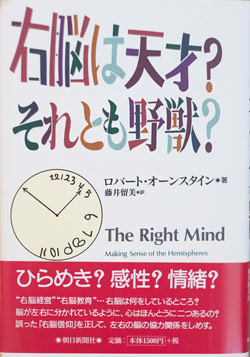
In this follow-up 25 years later to his classic Psychology of Consciousness, which first introduced us to the concept of specialized functions of the brain hemispheres, Ornstein draws on later research to dispel the popular myths and refine our understanding. While facts (what we might think of as text) are stored and processed in the left hemisphere, the right mind sets the context and makes sense of it all. It is this contextual function he argues, that may hold key to our ability to “choose, by a complex process involving all the brain’s power, what we might call ‘the right mind’ for different situations.”
Set of 7 Books in German:
3 sets available
On the Psychology of Meditation (original essay with Claudio Naranjo)
The authors drew on the history of Eastern religions and philosophies as well as on Western experimental laboratories. From Zen, Yoga, the Sufis, and shamanism came the roots of the book’s synthesis of the multiple manifestations of meditative techniques. From contemporary experimental work with computers and electroencephalograms came a new insight into the nature of consciousness. With Naranjo’s demonstration of the unity of meditation beyond its forms, and Ornstein’s “translation” of the metaphors of esoteric traditions into those of modern psychology, this book as a whole proved a keystone work in the study of the experiential, psychological, and physiological aspects of meditation, a practice which continues to proliferate in the world today. (See also Meditation and Modern Psychology, the 2008 update of this classic work).
The Psychology of Consciousness
In his revolutionary study, originally published in 1972 and in two subsequent revisions, Robert Ornstein examined the science to answer the question “What is consciousness?” and provide us with the concepts of “left” and “right” brain. In his 1986 “Completely Revised and Updated” edition, through a consideration of intuition and reason, he went beyond the theory that creative impulses originate in the right side of the brain and rational impulses originate in the left side to show how a synthesis of these two functions can bring about “a more complete science of human consciousness with an extended conception of our own capabilities.” He revisited the science some 25 years later in The Right Mind, to further evolve our understanding of the hemispheres.
The Amazing Brain – with Richard F. Thompson
With its stunning illustrations, this book continues to provide an accessible primer on the object responsible for everything from our most primitive behaviors to the creation of civilization – its construction, electrical and chemical processes, and “ramshackle” evolution over millions of years.
The Healing Brain – with David Sobel
In this intriguing, fact-filled exploration of the myriad healing powers of the brain, Ornstein and Sobel show us how the brain constantly interacts with the body, changing its responses to experience. Combining neurological research with holistic health concerns, The Healing Brain was an outgrowth of ISHK’s landmark seminar series that helped to launch the now ubiquitous understanding of the role of mind in health.
Healthy Pleasures – with David Sobel
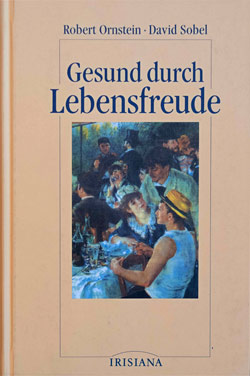
This book delivers the scientific evidence that pleasures – from saunas to siestas, chocolate to charity – and positive attitudes such as happiness to optimism are not only enjoyable but contribute to your life-long health.
The Evolution of Consciousness
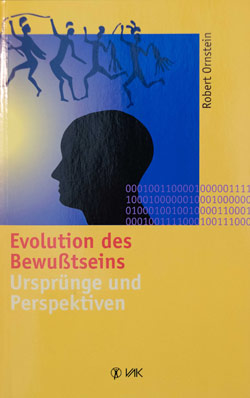
The culmination of Ornstein’s research on the structure and function of the human brain, this book shows how our minds, like all else on Earth, evolved to help us survive in our environment – to get food, avoid danger, and find the right mate – not to reason why. We think our conscious mind, “the self,” is in control, but in fact it is a small isolated part of the mind, sometimes called into play by consciousness, most often on the sidelines. We have many minds that shift into place, and “we” are not the same person from moment to moment, not the same “self” at all. The world we adapted to is long gone and we need to do nothing less than adapt anew. A tribal mind has no place in a global world.
The Healthy Mind, Healthy Body Handbook – with David Sobel
With your donation of $200, your choice of…
Set of 5 books in English:
10 sets available
The Psychology of Consciousness (1975)
In his revolutionary study, originally published in 1972 and in two subsequent revisions, Robert Ornstein examined the science to answer the question “What is consciousness?” and provide us with the concepts of “left” and “right” brain. In his 1986 “Completely Revised and Updated” edition, through a consideration of intuition and reason, he went beyond the theory that creative impulses originate in the right side of the brain and rational impulses originate in the left side to show how a synthesis of these two functions can bring about “a more complete science of human consciousness with an extended conception of our own capabilities.” He revisited the science some 25 years later in The Right Mind, to further evolve our understanding of the hemispheres.
Multimind (2003)
Multimind presents a startling new concept of how the human mind works – not as a super computer but a far more complicated system made up of a number of “computers,” each with a special function and each brought in sequentially and perhaps even simultaneously to process the immense amount of information we need to survive and deal with the outside world.
The Roots of the Self (1995)
The Right Mind (1997)
In this follow-up 25 years later to his classic Psychology of Consciousness, which first introduced us to the concept of specialized functions of the brain hemispheres, Ornstein draws on later research to dispel the popular myths and refine our understanding. While facts (what we might think of as text) are stored and processed in the left hemisphere, the right mind sets the context and makes sense of it all. It is this contextual function he argues, that may hold key to our ability to “choose, by a complex process involving all the brain’s power, what we might call ‘the right mind’ for different situations.”
Meditation and Modern Psychology (2008)
This update to the 1971 essay On the Psychology of Meditation by Claudio Naranjo and Robert Ornstein examines meditation from the perspectives of religions and philosophies such as Zen, Yoga, the Sufis and Christian mystics, and from the modern psychologist’s point of view – what is happening neurophysiologically and what is the resulting experience? This modern scientific view is sympathetic to the practice of meditation as a tool which, under the right direction, can leads to a different mode of perception.
Set of 5 Books in German:
5 sets available
The Psychology of Consciousness
In his revolutionary study, originally published in 1972 and in two subsequent revisions, Robert Ornstein examined the science to answer the question “What is consciousness?” and provide us with the concepts of “left” and “right” brain. In his 1986 “Completely Revised and Updated” edition, through a consideration of intuition and reason, he went beyond the theory that creative impulses originate in the right side of the brain and rational impulses originate in the left side to show how a synthesis of these two functions can bring about “a more complete science of human consciousness with an extended conception of our own capabilities.” He revisited the science some 25 years later in The Right Mind, to further evolve our understanding of the hemispheres.
The Amazing Brain – with Richard F. Thompson
With its stunning illustrations, this book continues to provide an accessible primer on the object responsible for everything from our most primitive behaviors to the creation of civilization – its construction, electrical and chemical processes, and “ramshackle” evolution over millions of years.
The Healing Brain – with David Sobel
In this intriguing, fact-filled exploration of the myriad healing powers of the brain, Ornstein and Sobel show us how the brain constantly interacts with the body, changing its responses to experience. Combining neurological research with holistic health concerns, The Healing Brain was an outgrowth of ISHK’s landmark seminar series that helped to launch the now ubiquitous understanding of the role of mind in health.
Healthy Pleasures – with David Sobel

This book delivers the scientific evidence that pleasures – from saunas to siestas, chocolate to charity – and positive attitudes such as happiness to optimism are not only enjoyable but contribute to your life-long health.
The Healthy Mind, Healthy Body Handbook – with David Sobel
Set of 5 Books in Dutch:
1 set available
The Psychology of Consciousness
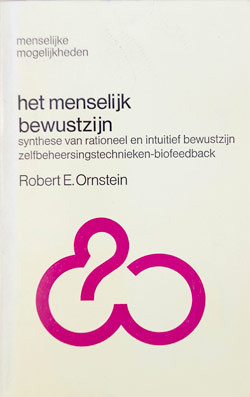
In his revolutionary study, originally published in 1972 and in two subsequent revisions, Robert Ornstein examined the science to answer the question “What is consciousness?” and provide us with the concepts of “left” and “right” brain. In his 1986 “Completely Revised and Updated” edition, through a consideration of intuition and reason, he went beyond the theory that creative impulses originate in the right side of the brain and rational impulses originate in the left side to show how a synthesis of these two functions can bring about “a more complete science of human consciousness with an extended conception of our own capabilities.” He revisited the science some 25 years later in The Right Mind, to further evolve our understanding of the hemispheres.
The Amazing Brain – with Richard F. Thompson
With its stunning illustrations, this book continues to provide an accessible primer on the object responsible for everything from our most primitive behaviors to the creation of civilization – its construction, electrical and chemical processes, and “ramshackle” evolution over millions of years.
Multimind
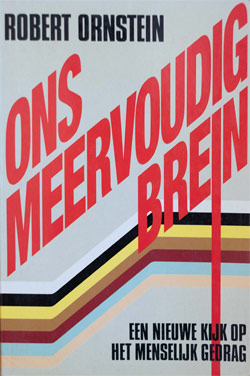
Multimind presents a startling new concept of how the human mind works – not as a super computer but a far more complicated system made up of a number of “computers,” each with a special function and each brought in sequentially and perhaps even simultaneously to process the immense amount of information we need to survive and deal with the outside world.
On the Psychology of Meditation (original essay with Claudio Naranjo)
The authors drew on the history of Eastern religions and philosophies as well as on Western experimental laboratories. From Zen, Yoga, the Sufis, and shamanism came the roots of the book’s synthesis of the multiple manifestations of meditative techniques. From contemporary experimental work with computers and electroencephalograms came a new insight into the nature of consciousness. With Naranjo’s demonstration of the unity of meditation beyond its forms, and Ornstein’s “translation” of the metaphors of esoteric traditions into those of modern psychology, this book as a whole proved a keystone work in the study of the experiential, psychological, and physiological aspects of meditation, a practice which continues to proliferate in the world today. (See also Meditation and Modern Psychology, the 2008 update of this classic work).
Healthy Pleasures – with David Sobel
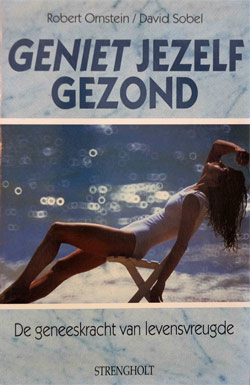
This book delivers the scientific evidence that pleasures – from saunas to siestas, chocolate to charity – and positive attitudes such as happiness to optimism are not only enjoyable but contribute to your life-long health.
Set of 4 books in Japanese:
1 sets available
The Right Mind

In this follow-up 25 years later to his classic Psychology of Consciousness, which first introduced us to the concept of specialized functions of the brain hemispheres, Ornstein draws on later research to dispel the popular myths and refine our understanding. While facts (what we might think of as text) are stored and processed in the left hemisphere, the right mind sets the context and makes sense of it all. It is this contextual function he argues, that may hold key to our ability to “choose, by a complex process involving all the brain’s power, what we might call ‘the right mind’ for different situations.”
Healthy Pleasures – with David Sobel
This book delivers the scientific evidence that pleasures – from saunas to siestas, chocolate to charity – and positive attitudes such as happiness to optimism are not only enjoyable but contribute to your life-long health.
The Amazing Brain – with Richard F. Thompson
With its stunning illustrations, this book continues to provide an accessible primer on the object responsible for everything from our most primitive behaviors to the creation of civilization – its construction, electrical and chemical processes, and “ramshackle” evolution over millions of years.
The Axemaker’s Gift – with James Burke
Set of 4 Books in Swedish:
4 sets available
Multimind
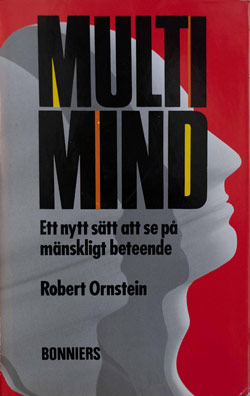
Multimind presents a startling new concept of how the human mind works – not as a super computer but a far more complicated system made up of a number of “computers,” each with a special function and each brought in sequentially and perhaps even simultaneously to process the immense amount of information we need to survive and deal with the outside world.
The Healing Brain – with David Sobel
In this intriguing, fact-filled exploration of the myriad healing powers of the brain, Ornstein and Sobel show us how the brain constantly interacts with the body, changing its responses to experience. Combining neurological research with holistic health concerns, The Healing Brain was an outgrowth of ISHK’s landmark seminar series that helped to launch the now ubiquitous understanding of the role of mind in health.
Healthy Pleasures – with David Sobel
This book delivers the scientific evidence that pleasures – from saunas to siestas, chocolate to charity – and positive attitudes such as happiness to optimism are not only enjoyable but contribute to your life-long health.
The Evolution of Consciousness
With your donation of $175, your choice of…
Set of 3 Books in English:
10 sets available
Multimind (1986)
Multimind presents a startling new concept of how the human mind works – not as a super computer but a far more complicated system made up of a number of “computers,” each with a special function and each brought in sequentially and perhaps even simultaneously to process the immense amount of information we need to survive and deal with the outside world.
The Right Mind (1997)
In this follow-up 25 years later to his classic Psychology of Consciousness, which first introduced us to the concept of specialized functions of the brain hemispheres, Ornstein draws on later research to dispel the popular myths and refine our understanding. While facts (what we might think of as text) are stored and processed in the left hemisphere, the right mind sets the context and makes sense of it all. It is this contextual function he argues, that may hold key to our ability to “choose, by a complex process involving all the brain’s power, what we might call ‘the right mind’ for different situations.”
Meditation and Modern Psychology (2008)
This update to the 1971 essay On the Psychology of Meditation by Claudio Naranjo and Robert Ornstein examines meditation from the perspectives of religions and philosophies such as Zen, Yoga, the Sufis and Christian mystics, and from the modern psychologist’s point of view – what is happening neurophysiologically and what is the resulting experience? This modern scientific view is sympathetic to the practice of meditation as a tool which, under the right direction, can leads to a different mode of perception.
Set of 3 Books in German:
1 set available
On the Psychology of Meditation (original essay with Claudio Naranjo)
The authors drew on the history of Eastern religions and philosophies as well as on Western experimental laboratories. From Zen, Yoga, the Sufis, and shamanism came the roots of the book’s synthesis of the multiple manifestations of meditative techniques. From contemporary experimental work with computers and electroencephalograms came a new insight into the nature of consciousness. With Naranjo’s demonstration of the unity of meditation beyond its forms, and Ornstein’s “translation” of the metaphors of esoteric traditions into those of modern psychology, this book as a whole proved a keystone work in the study of the experiential, psychological, and physiological aspects of meditation, a practice which continues to proliferate in the world today. (See also Meditation and Modern Psychology, the 2008 update of this classic work).
The Psychology of Consciousness
In his revolutionary study, originally published in 1972 and in two subsequent revisions, Robert Ornstein examined the science to answer the question “What is consciousness?” and provide us with the concepts of “left” and “right” brain. In his 1986 “Completely Revised and Updated” edition, through a consideration of intuition and reason, he went beyond the theory that creative impulses originate in the right side of the brain and rational impulses originate in the left side to show how a synthesis of these two functions can bring about “a more complete science of human consciousness with an extended conception of our own capabilities.” He revisited the science some 25 years later in The Right Mind, to further evolve our understanding of the hemispheres.
The Amazing Brain – with Richard F. Thompson
With its stunning illustrations, this book continues to provide an accessible primer on the object responsible for everything from our most primitive behaviors to the creation of civilization – its construction, electrical and chemical processes, and “ramshackle” evolution over millions of years.
Set of 3 Books in Japanese:
2 sets available
The Amazing Brain – with Richard F. Thompson
With its stunning illustrations, this book continues to provide an accessible primer on the object responsible for everything from our most primitive behaviors to the creation of civilization – its construction, electrical and chemical processes, and “ramshackle” evolution over millions of years.
Healthy Pleasures – with David Sobel
This book delivers the scientific evidence that pleasures – from saunas to siestas, chocolate to charity – and positive attitudes such as happiness to optimism are not only enjoyable but contribute to your life-long health.
The Right Mind

In this follow-up 25 years later to his classic Psychology of Consciousness, which first introduced us to the concept of specialized functions of the brain hemispheres, Ornstein draws on later research to dispel the popular myths and refine our understanding. While facts (what we might think of as text) are stored and processed in the left hemisphere, the right mind sets the context and makes sense of it all. It is this contextual function he argues, that may hold key to our ability to “choose, by a complex process involving all the brain’s power, what we might call ‘the right mind’ for different situations.”
Set of 3 Books in Swedish:
2 sets available
The Healing Brain – with David Sobel
In this intriguing, fact-filled exploration of the myriad healing powers of the brain, Ornstein and Sobel show us how the brain constantly interacts with the body, changing its responses to experience. Combining neurological research with holistic health concerns, The Healing Brain was an outgrowth of ISHK’s landmark seminar series that helped to launch the now ubiquitous understanding of the role of mind in health.
Healthy Pleasures – with David Sobel
This book delivers the scientific evidence that pleasures – from saunas to siestas, chocolate to charity – and positive attitudes such as happiness to optimism are not only enjoyable but contribute to your life-long health.
The Evolution of Consciousness
Set of 3 Books in Dutch:
1 set available
The Psychology of Consciousness

In his revolutionary study, originally published in 1972 and in two subsequent revisions, Robert Ornstein examined the science to answer the question “What is consciousness?” and provide us with the concepts of “left” and “right” brain. In his 1986 “Completely Revised and Updated” edition, through a consideration of intuition and reason, he went beyond the theory that creative impulses originate in the right side of the brain and rational impulses originate in the left side to show how a synthesis of these two functions can bring about “a more complete science of human consciousness with an extended conception of our own capabilities.” He revisited the science some 25 years later in The Right Mind, to further evolve our understanding of the hemispheres.
Multimind

Multimind presents a startling new concept of how the human mind works – not as a super computer but a far more complicated system made up of a number of “computers,” each with a special function and each brought in sequentially and perhaps even simultaneously to process the immense amount of information we need to survive and deal with the outside world.
The Amazing Brain – with Richard F. Thompson
With its stunning illustrations, this book continues to provide an accessible primer on the object responsible for everything from our most primitive behaviors to the creation of civilization – its construction, electrical and chemical processes, and “ramshackle” evolution over millions of years.
Set of 3 Books in Spanish:
2 sets available
The Psychology of Consciousness
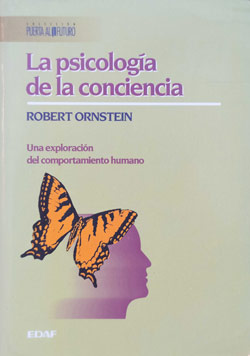
In his revolutionary study, originally published in 1972 and in two subsequent revisions, Robert Ornstein examined the science to answer the question “What is consciousness?” and provide us with the concepts of “left” and “right” brain. In his 1986 “Completely Revised and Updated” edition, through a consideration of intuition and reason, he went beyond the theory that creative impulses originate in the right side of the brain and rational impulses originate in the left side to show how a synthesis of these two functions can bring about “a more complete science of human consciousness with an extended conception of our own capabilities.” He revisited the science some 25 years later in The Right Mind, to further evolve our understanding of the hemispheres.
The Evolution of Consciousness
The Axemaker’s Gift – with James Burke
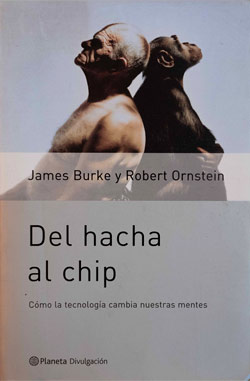
At the close of this century of creativity and discovery, humanists and scientists alike wonder: How could human beings in all their brilliance –those “axemakers” with the genius to invent, lead, inspire, heal, design – have brought the world to the brink of destruction? The answers can be found in this imaginative and brilliantly informed double-edged history of human culture.
Set of 3 Books in Portuguese:
1 set available
Healthy Pleasures – with David Sobel
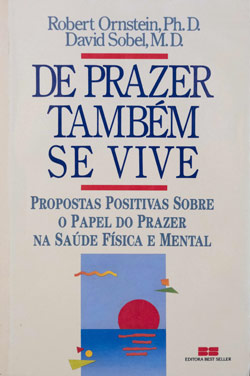
This book delivers the scientific evidence that pleasures – from saunas to siestas, chocolate to charity – and positive attitudes such as happiness to optimism are not only enjoyable but contribute to your life-long health.
The Evolution of Consciousness (Brazilian)
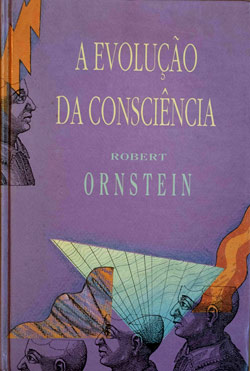
The culmination of Ornstein’s research on the structure and function of the human brain, this book shows how our minds, like all else on Earth, evolved to help us survive in our environment – to get food, avoid danger, and find the right mate – not to reason why. We think our conscious mind, “the self,” is in control, but in fact it is a small isolated part of the mind, sometimes called into play by consciousness, most often on the sidelines. We have many minds that shift into place, and “we” are not the same person from moment to moment, not the same “self” at all. The world we adapted to is long gone and we need to do nothing less than adapt anew. A tribal mind has no place in a global world.
The Right Mind (Brazilian)
In this follow-up 25 years later to his classic Psychology of Consciousness, which first introduced us to the concept of specialized functions of the brain hemispheres, Ornstein draws on later research to dispel the popular myths and refine our understanding. While facts (what we might think of as text) are stored and processed in the left hemisphere, the right mind sets the context and makes sense of it all. It is this contextual function he argues, that may hold key to our ability to “choose, by a complex process involving all the brain’s power, what we might call ‘the right mind’ for different situations.”
With your donation of $125, your choice of…
Set of 2 Books in English:
50 sets available
Multimind (1986)
Multimind presents a startling new concept of how the human mind works – not as a super computer but a far more complicated system made up of a number of “computers,” each with a special function and each brought in sequentially and perhaps even simultaneously to process the immense amount of information we need to survive and deal with the outside world.
Meditation and Modern Psychology (2008)
This update to the 1971 essay On the Psychology of Meditation by Claudio Naranjo and Robert Ornstein examines meditation from the perspectives of religions and philosophies such as Zen, Yoga, the Sufis and Christian mystics, and from the modern psychologist’s point of view – what is happening neurophysiologically and what is the resulting experience? This modern scientific view is sympathetic to the practice of meditation as a tool which, under the right direction, can leads to a different mode of perception.
Set of 2 Books in French:
3 sets available
The Amazing Brain – with Richard F. Thompson
With its stunning illustrations, this book continues to provide an accessible primer on the object responsible for everything from our most primitive behaviors to the creation of civilization – its construction, electrical and chemical processes, and “ramshackle” evolution over millions of years.
Healthy Pleasures – with David Sobel
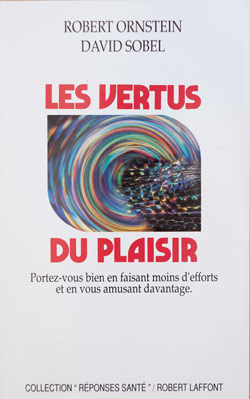
This book delivers the scientific evidence that pleasures – from saunas to siestas, chocolate to charity – and positive attitudes such as happiness to optimism are not only enjoyable but contribute to your life-long health.
Set of 2 Books in Japanese:
1 set available
The Amazing Brain – with Richard F. Thompson
With its stunning illustrations, this book continues to provide an accessible primer on the object responsible for everything from our most primitive behaviors to the creation of civilization – its construction, electrical and chemical processes, and “ramshackle” evolution over millions of years.
The Right Mind

In this follow-up 25 years later to his classic Psychology of Consciousness, which first introduced us to the concept of specialized functions of the brain hemispheres, Ornstein draws on later research to dispel the popular myths and refine our understanding. While facts (what we might think of as text) are stored and processed in the left hemisphere, the right mind sets the context and makes sense of it all. It is this contextual function he argues, that may hold key to our ability to “choose, by a complex process involving all the brain’s power, what we might call ‘the right mind’ for different situations.”
Set of 2 Books in Swedish:
5 sets available
Healthy Pleasures – with David Sobel
This book delivers the scientific evidence that pleasures – from saunas to siestas, chocolate to charity – and positive attitudes such as happiness to optimism are not only enjoyable but contribute to your life-long health.
The Evolution of Consciousness
Set of 2 Books in Portuguese:
3 sets available
Healthy Pleasures – with David Sobel

This book delivers the scientific evidence that pleasures – from saunas to siestas, chocolate to charity – and positive attitudes such as happiness to optimism are not only enjoyable but contribute to your life-long health.
The Right Mind (Brazilian)
In this follow-up 25 years later to his classic Psychology of Consciousness, which first introduced us to the concept of specialized functions of the brain hemispheres, Ornstein draws on later research to dispel the popular myths and refine our understanding. While facts (what we might think of as text) are stored and processed in the left hemisphere, the right mind sets the context and makes sense of it all. It is this contextual function he argues, that may hold key to our ability to “choose, by a complex process involving all the brain’s power, what we might call ‘the right mind’ for different situations.”
Set of 2 Books in Italian:
2 sets available
The Amazing Brain – with Richard F. Thompson
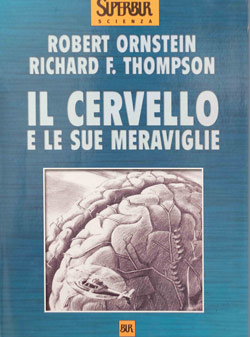
With its stunning illustrations, this book continues to provide an accessible primer on the object responsible for everything from our most primitive behaviors to the creation of civilization – its construction, electrical and chemical processes, and “ramshackle” evolution over millions of years.
Healthy Pleasures – with David Sobel
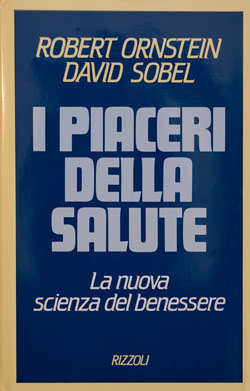
This book delivers the scientific evidence that pleasures – from saunas to siestas, chocolate to charity – and positive attitudes such as happiness to optimism are not only enjoyable but contribute to your life-long health.
With your donation of $100, your choice of a single book…
Books in English
On the Psychology of Meditation (7 available)
The authors drew on the history of Eastern religions and philosophies as well as on Western experimental laboratories. From Zen, Yoga, the Sufis, and shamanism came the roots of the book’s synthesis of the multiple manifestations of meditative techniques. From contemporary experimental work with computers and electroencephalograms came a new insight into the nature of consciousness. With Naranjo’s demonstration of the unity of meditation beyond its forms, and Ornstein’s “translation” of the metaphors of esoteric traditions into those of modern psychology, this book as a whole proved a keystone work in the study of the experiential, psychological, and physiological aspects of meditation, a practice which continues to proliferate in the world today. (See also Meditation and Modern Psychology, the 2008 update of this classic work).
The Nature of Human Consciousness (8 available)

Drawn from the fields of anthropology, psychology, philosophy, mystical religion, and physiology, this early work provide a tableau of insights into human consciousness. The ideas of William James shed light on those of Idries Shah, who writes of the Sufis. Carl Jung’s discussion of “Synchronicity” provides background for Charles Tart’s “Preliminary Notes on the Nature of Psi Processes.” As a young and imaginative psychologist and researcher, Ornstein collected and conceptually integrated 41 articles into a book that continues to serve as stimulating reading on cognition and consciousness.
On the Experience of Time (1 available)
How do we experience time? What do we use to experience it? As a young graduate student Robert Ornstein showed, in a series of remarkable experiments, that it is difficult to maintain an “inner clock” explanation of the experience of time. He postulated a cognitive, information-processing approach that alone makes sense out of the very different data of the experience of time and, in particular, of the experience of duration – the lengthening of duration under LSD, for example, or the effects of an experience felt to be a success rather than a failure, time in sensory deprivation, the time-order effect, or the influence of a sedative or stimulant drug.
The Psychology of Consciousness (6 available)
In his revolutionary study, originally published in 1972 and in two subsequent revisions, Robert Ornstein examined the science to answer the question “What is consciousness?” and provide us with the concepts of “left” and “right” brain. In his 1986 “Completely Revised and Updated” edition, through a consideration of intuition and reason, he went beyond the theory that creative impulses originate in the right side of the brain and rational impulses originate in the left side to show how a synthesis of these two functions can bring about “a more complete science of human consciousness with an extended conception of our own capabilities.” He revisited the science some 25 years later in The Right Mind, to further evolve our understanding of the hemispheres.
Symposium on Consciousness (7 available)

This collection of papers was presented at the annual meeting of the American Association for the Advancement of Science in 1974 at a symposium conceived and arranged by Robert Ornstein and Philip R. Lee, Assistant Secretary for Health and Human Services in the Johnson administration, in conjunction with the Institute for the Study of Human Knowledge. Though much has been learned in the nearly half century since the event, the book stands as a foundational work in brain/consciousness research.
Psychology: The Study of Human Experience (textbook) (2 available)
In his preface to this work, Ornstein writes that the idea for this work came to him as a student in his first introductory psychology class. Some 25 years later he delivered “the story of our lives. It begins where human life emerges and continues in each of us, until we die. In it there are glimpses of the human condition and of human possibilities…I hope to show clearly how extraordinary the ordinary experience of life really is.”
The Healing Brain: A Scientific Reader – with Charles Swenciones (7 available)

This volume, composed of contributions by noted researchers in psychiatry, psychology, and neuroscience, explains the fascinating investigations of brain-mind-body relationships that changed the way we think about health and illness.
The Amazing Brain – with Richard F. Thompson (9 available)
With its stunning illustrations, this book continues to provide an accessible primer on the object responsible for everything from our most primitive behaviors to the creation of civilization – its construction, electrical and chemical processes, and “ramshackle” evolution over millions of years.
The Evolution of Consciousness (4 available)
The Roots of the Self (2 available)
People everywhere have created simple and complex systems to attempt to make sense of the riddles of individuality. This book illuminates the science: the intricate building blocks of genetics (such as sex and eye color) and environment (including family size and birth order) that shape us from womb to grave. It explores the equally important bedrock foundations of temperament – the biological basis of extroversion and introversion, organization and spontaneity, and optimism and pessimism – the “basic rootstock of individuality” that determines how we will respond to stimuli.
The Mind Field (5 available)
The excesses of the self-improvement packagers have obscured what may be of real value. Meditation may be a valid method for eliminating stress, but are maharishis and franchised growth centers the requisites for achieving peace of mind? How is it that promoters have supplanted real teachers in the realm of consciousness? Ornstein extends his argument to the sacrosanct psychiatric profession, as well as to meditation, para-psychologies, shamanism, and the numerous trademarked “awareness systems.”
The Axemaker’s Gift – with James Burke (3 available)

At the close of this century of creativity and discovery, humanists and scientists alike wonder: How could human beings in all their brilliance –those “axemakers” with the genius to invent, lead, inspire, heal, design – have brought the world to the brink of destruction? The answers can be found in this imaginative and brilliantly informed double-edged history of human culture.
The Right Mind (3 available)
In this follow-up 25 years later to his classic Psychology of Consciousness, which first introduced us to the concept of specialized functions of the brain hemispheres, Ornstein draws on later research to dispel the popular myths and refine our understanding. While facts (what we might think of as text) are stored and processed in the left hemisphere, the right mind sets the context and makes sense of it all. It is this contextual function he argues, that may hold key to our ability to “choose, by a complex process involving all the brain’s power, what we might call ‘the right mind’ for different situations.”
Multimind (1 available)
Multimind presents a startling new concept of how the human mind works – not as a super computer but a far more complicated system made up of a number of “computers,” each with a special function and each brought in sequentially and perhaps even simultaneously to process the immense amount of information we need to survive and deal with the outside world.
Meditation and Modern Psychology (15 available)
This update to the 1971 essay On the Psychology of Meditation by Claudio Naranjo and Robert Ornstein examines meditation from the perspectives of religions and philosophies such as Zen, Yoga, the Sufis and Christian mystics, and from the modern psychologist’s point of view – what is happening neurophysiologically and what is the resulting experience? This modern scientific view is sympathetic to the practice of meditation as a tool which, under the right direction, can leads to a different mode of perception.
The Healing Brain – with David Sobel (2 available)
In this intriguing, fact-filled exploration of the myriad healing powers of the brain, Ornstein and Sobel show us how the brain constantly interacts with the body, changing its responses to experience. Combining neurological research with holistic health concerns, The Healing Brain was an outgrowth of ISHK’s landmark seminar series that helped to launch the now ubiquitous understanding of the role of mind in health.
New World New Mind – with Paul Eherlich (4 available)

Culturally and biologically, humankind has evolved further and faster than any other species on earth. In the process, we have also changed the planet more in the past ten thousand years than all its inhabitants did in the first four million. Almost three decades ago, New World New Mind provided a lucid investigation into what we have done to our planet . . . and a warning about the consequences of progress “as usual.” Unless we consciously evolve to fit our advanced society, we will destroy all that we have created. We need to develop a new mind – a set of thought processes, reactions, perceptions, and impulses – for our new world.
Humanity on a Tightrope with Paul Ehrlich (5 available)

The two seasoned authors tackle the question of family and what it means to us now and how it might change to help us address the problems that affect us all.
Mind Real (2 available)

This book details one of the most startling findings of modern science: We don’t experience the world as it is, but as virtual reality. This crucial insight provides a meeting point for students of the mind, brain, philosophy and religion, as all these disciplines begin at the same place. Mind Real is, in part, a summa of Dr. Ornstein’s research and writing of the previous 35 years.
Books in Other Languages
French: Healthy Pleasures (8 available)

This book delivers the scientific evidence that pleasures – from saunas to siestas, chocolate to charity – and positive attitudes such as happiness to optimism are not only enjoyable but contribute to your life-long health.
German: The Amazing Brain (3 available)
With its stunning illustrations, this book continues to provide an accessible primer on the object responsible for everything from our most primitive behaviors to the creation of civilization – its construction, electrical and chemical processes, and “ramshackle” evolution over millions of years.
Portuguese: Healthy Pleasures (2 available)

This book delivers the scientific evidence that pleasures – from saunas to siestas, chocolate to charity – and positive attitudes such as happiness to optimism are not only enjoyable but contribute to your life-long health.
Swedish: The Evolution of Consciousness (4 available)
Italian: The Amazing Brain (14 available)

With its stunning illustrations, this book continues to provide an accessible primer on the object responsible for everything from our most primitive behaviors to the creation of civilization – its construction, electrical and chemical processes, and “ramshackle” evolution over millions of years.
Dutch: Multimind (8 available)

Multimind presents a startling new concept of how the human mind works – not as a super computer but a far more complicated system made up of a number of “computers,” each with a special function and each brought in sequentially and perhaps even simultaneously to process the immense amount of information we need to survive and deal with the outside world.
Danish: Healthy Pleasures (23 available)

This book delivers the scientific evidence that pleasures – from saunas to siestas, chocolate to charity – and positive attitudes such as happiness to optimism are not only enjoyable but contribute to your life-long health.
Norwegian: Healthy Pleasures (6 available)
This book delivers the scientific evidence that pleasures – from saunas to siestas, chocolate to charity – and positive attitudes such as happiness to optimism are not only enjoyable but contribute to your life-long health.
Greek: On the Psychology of Meditation (2 available)
The authors drew on the history of Eastern religions and philosophies as well as on Western experimental laboratories. From Zen, Yoga, the Sufis, and shamanism came the roots of the book’s synthesis of the multiple manifestations of meditative techniques. From contemporary experimental work with computers and electroencephalograms came a new insight into the nature of consciousness. With Naranjo’s demonstration of the unity of meditation beyond its forms, and Ornstein’s “translation” of the metaphors of esoteric traditions into those of modern psychology, this book as a whole proved a keystone work in the study of the experiential, psychological, and physiological aspects of meditation, a practice which continues to proliferate in the world today. (See also Meditation and Modern Psychology, the 2008 update of this classic work).
Finish: Multimind (10 available)
Multimind presents a startling new concept of how the human mind works – not as a super computer but a far more complicated system made up of a number of “computers,” each with a special function and each brought in sequentially and perhaps even simultaneously to process the immense amount of information we need to survive and deal with the outside world.
Hebrew: The Healing Brain (3 available)
In this intriguing, fact-filled exploration of the myriad healing powers of the brain, Ornstein and Sobel show us how the brain constantly interacts with the body, changing its responses to experience. Combining neurological research with holistic health concerns, The Healing Brain was an outgrowth of ISHK’s landmark seminar series that helped to launch the now ubiquitous understanding of the role of mind in health.
Russian: The Axemaker’s Gift (13 available)

At the close of this century of creativity and discovery, humanists and scientists alike wonder: How could human beings in all their brilliance –those “axemakers” with the genius to invent, lead, inspire, heal, design – have brought the world to the brink of destruction? The answers can be found in this imaginative and brilliantly informed double-edged history of human culture.
Receive a single book in English* with any donation amount.
*unless otherwise requested by email at is*****@*ol.com.
